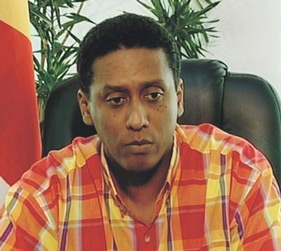

DANNY FAURE:

The government is planning to increase further the taxes on fuel. This is what can be deduced from the interview Mr Danny Faure, the Minister of Finance, gave to SBC on Wednesday evening.
The special interview was ostensibly to explain the “restructuring” that is supposedly is going on in the Ministry of Finance. Most of the viewers, however, were interested in his comments on the economy, as his demeanour seemed to have suddenly changed from that of his maiden budget speech in December last year. Then, under the section “Outlook for the Future” he claimed, “Future prospects are on the bright side. The economy is anticipated to record further improvements on many important fronts.”
Faure did not explicitly admit that taxes on fuel or gasoline would be increased soon, during his interview. However, by singling out the fact that the country was consuming the equivalent of US$ 177,000 worth of gasoline every day of the year before revealing that he would be making an announcement on the question of fuel in the next few days, it is legitimate to conclude that this is the government’s intention. In any event, the country has been bracing for an increase in the price of gasoline at the pumps for some weeks now since rumours have been rife on this topic for some time. Just what economic sense this will make remains to be seen.
In the interview, Faure said that this year the value of the fuel, which we have to import, rose from US$15m in 2001 to US$ 60m, which according to him, is causing serious problems for the country in finding adequate foreign exchange for its importation. Whilst this may cause some problem for SEPEC, since fuel is sold in rupees while it is imported in dollars, government continues to generate substantial revenues on the domestic consumption of fuel. SBC conveniently forgot to ask Faure about the new US$ 30,000,000 government bonds which the government has suddenly decided to issue in a most non-transparent secretive way, despite their claim that we had paid all our debt arrears with the previous US$ 200,000,000 bonds issued last year.
According to the statistics made available to Members of the National Assembly (MNA) during the presentation of the budget each year, government collects very substantial revenues from various taxes imposed on fuel for domestic consumption. In 1996, for example these taxes generated SR 123,474,000. In 2006, however, revenues from taxes on fuel shot up to SR 186,000,000, an increase of 51% in the space of ten years.
In 1996, there were two types of taxes of fuel. The most important one was the trades’ tax imposed at the port based on the CIF price of the commodity – like everything else imported into
The price of gasoline at the pumps in
Given that the total number of vehicles registered was 11,012 in 2006 and our country has only about 500 km of road on which to drive, taxes on fuel during the year would add SR SR17, 000 to run each vehicle or SR370, 518 for each kilometre of road driven on.
Transportation, distribution and communication sector of the economy, according to statistics, account for 28% of the Gross Domestic Product (GDP). While an increase in taxation would raise the GDP value of the transportation and distribution sector, it would do so by an inflationary increase in the costs of services, which will have an impact on other services, which rely on transportation as well as on the disposable income of the lower paid.